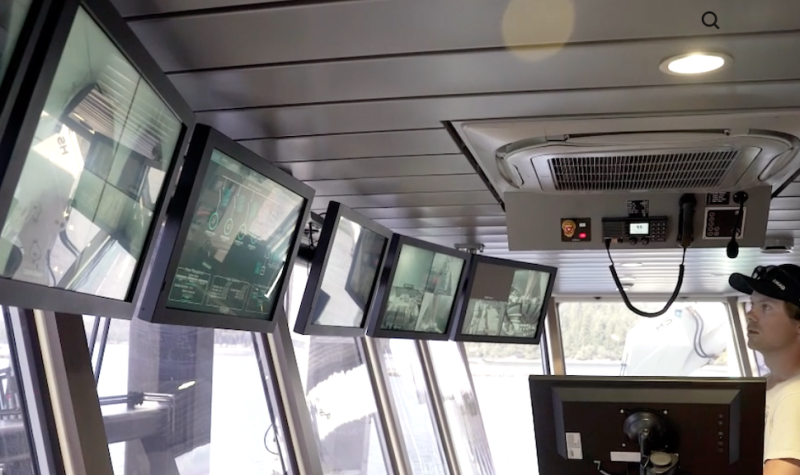By Roy L Hales
In the third of a series of articles about the need for a transition plan, John Paul Fraser, President of the BC Salmon Farmers Association, considers the industry’s prospects for survival.
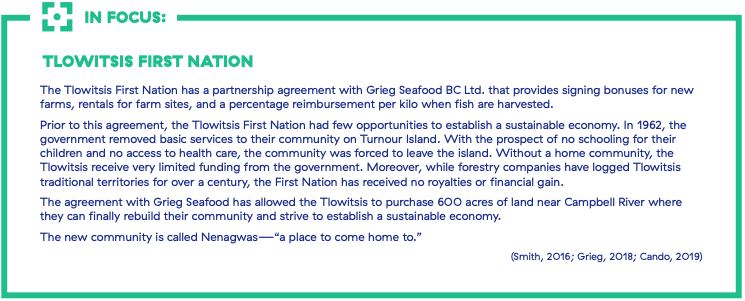
From Raising Opportunity: How BC Salmon could lead BC’s Post COVID Recovery
Make tough decisions smart
“You can make these tough decisions smart. You actually find out how to do it in a way where time and preparation help reduce the temperature. Help create a plan to move forward, and maybe also help invigorate local discussion. There is no question that this is also a good thing,” he began.
As regards the Minister of Fisheries decision to phase out the Discovery Island’s fish farms by June 30th, 2022, Fraser said, “Eighteen months … is a completely untenable and unworkable time frame to exercise any kind of transition, or whatever you may call it.”
He described the process as “really about termination.”
“I think the part that really upsets a lot of people … is that this government made absolutely no effort.”
Fraser compared this current process to the much more professional manner that provincial government handled a similar situation in the Broughton Archipeligo.
“It is really unfortunate for the broader community that this government didn’t figure out a way … for everyone to come together. Reconciliation is about everyone coming together to reconcile grievances and maybe move forward together. It is arduous and difficult, but maybe not impossible.”
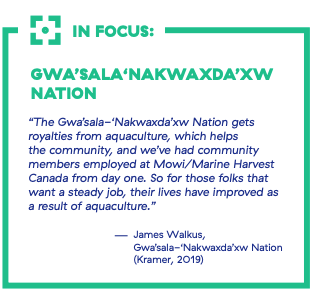
From Raising Opportunity: How BC Salmon could lead BC’s Post COVID Recovery
1,500 jobs
In yesterday’s Cortes Radio news report, one of the biologists opposing fish farms questioned an industry statement that 1,500 people would lose their jobs.
Someone in the BC Salmon Farmer’s Association explained that the actual number is 1,498 direct and indirect jobs.
According to the report ‘Raising Opportunity: How BC Salmon could lead BC’s Post COVID Recovery,” there are 572 from Campbell River, Sayward and the Discovery Islands directly employed in this sector.
John Paul Fraser used much more personal terms, “The industry is full of people. People are what make this, like all industries, special. When you talk about phasing out farms, what does that really mean? Farms are obviously a place governed by a lot of very rigorous regulation, with people who live there as part of their work.”
He stressed the fact that people on salmon farms are in the midst of nature.
“On the farm, you are almost like a family because you are in close proximity for 5 to 6 days at a time. You live there … You’re always looking at the salmon … at the environment and you are always feeding and caring. That’s a farm.”
Fraser stressed the idea that losing their ‘jobs’ represented something very important to these workers.
“Very real, very raw and now it is something incredibly bitter, but that is just the farm. There is so much going into that – from off the farm”
Salmon farms employ contractors, technology providers, divers who check and clean nets, the people who bring fish in and transport them to market.
Fraser added, “Then all the induced and indirect jobs, in and around the community. Like the car dealership, the restaurant and then ultimately people’s families. So when you are talking about closing a farm, you are talking about closing a lot of things down for a lot of people.”
“… This is not a decision that can be executed without a tremendous amount of pain and hardship. It starts with people who care a lot about what they do and the environment in which they do it.”
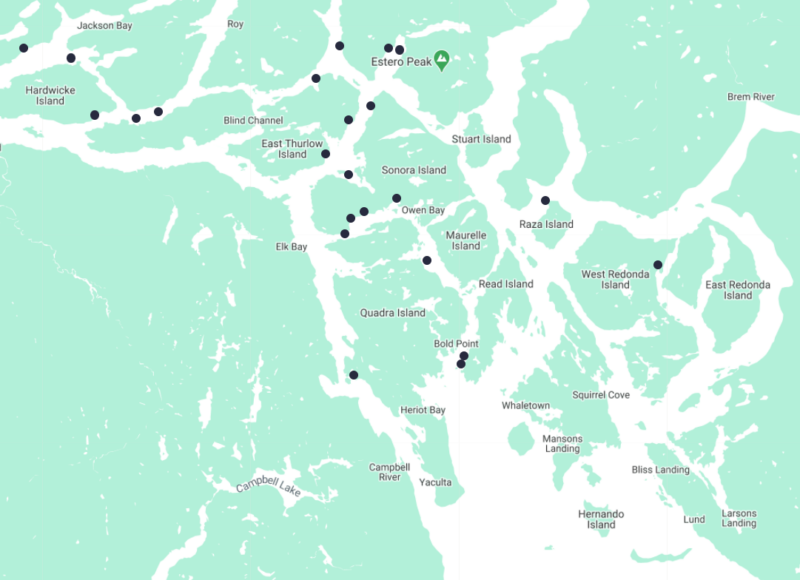
Locations of the Discovery Island fish farms – screenshot from the BC Salmon Farmers Association
The Cohen Commission
“This area was covered by that $25 million dollar, three and a half year Cohen Commission process, which yielded a recommendation that the farms in the Discovery Islands ought to be removed unless independent science could verify that they pose no more than minimal risk to migrated Fraser River sockeye. In nine risk assessments, nine years later, that was actually the conclusion. And by the way this isn’t our science, it is all government science and it is all reviewed by scientists,” said Fraser.
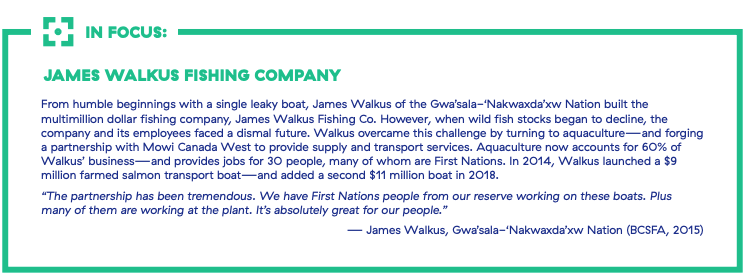
Locations of the Discovery Island fish farms – screenshot from the BC Salmon Farmers Association
What about Sea Lice?
What about sea lice, which wasn’t included in the assessments?
“You ‘ll have to go back to DFO and ask why that wasn’t a risk assessment …” said Fraser.
(Cortes Currents did ask, and here is the DFO’s reply.)
Fraser continued, “ … I think their answer has been ‘We assess that all the time.’”
He gives several details in the podcast before stressing, “What people don’t understand is that typically, when you are fighting lice … you are fighting to keep it from coming in. The problem is that when it comes in it can amplify and then how do you get on that problem so that it doesn’t become a bigger problem.”
”One of the companies has just spent $25 million on new lice mitigation technology, in the form of a vessel which is already being deployed by all the companies across the province to effectively – with no pollutants or chemicals. Just simply coming on board, washing them off and sending them back in … That was going to be for the Discovery Islands, but that may have to go elsewhere now.”
“I know the companies are very proud of how hard they work and how much they have invested in lice management.”

From Raising Opportunity: How BC Salmon could lead BC’s Post COVID Recovery
Transitioning to Land
Fraser described the idea of transitioning to land “very interesting” but probably not even in the realm of possible when you are talking about 87 metric tonnes.
“People talk about the land based system down in Miami, which is a fine example of massive factory production, except for the fact there are almost no environmental laws in Florida and they dump all of their waste water in to the aquifer. They searched the world to find that site. So to say we can transition onto land in our communities, when we don’t understand the land use, is going to be significant,” he said.
“We have members in our association who are land farmers and they can tell you how hard it is. The problem is that here in British Columbia people who are espousing land based aquaculture have never really done it. The people who are doing it will tell you the people espousing it are out of their minds.”
If the province insists that salmon must be grown on land, the industry will move elsewhere.
“They like to espouse this as a solution.. but they don’t really know what they are talking about, and what they are really saying is they want salmon farms to be gone…”
“There is a reason salmon farms are where they are; we have an ocean.”
First Nations
The Ministry of fisheries said that seven First Nations in the Discovery Islands (the Holmalco, Klahoose, K’omoks, Tla’amin, We Wai Kai, Wei Wai Kum and Kwiakah) heavily informed the decision to phase out fish farms.’
Q/ Were they all against fish farms?
“I don’t know. We’ve been very careful in the process, and out of the process, to try to not play interpretive theatre about what may or may not have happened. It would be disrespectful to the nations and their leadership,” said Fraser.
He added, “Industry has been supremely supportive of UNDRIP, was there in the Legislature when the provincial legislation was passed – the first of its kind in Canada. Working in partnership with indigenous communities is fundamental . In some cases the nations own the sites and license. We support them through operating agreements.”
According to the report Raising Opportunity, “BC salmon farmers hold partnership agreements with 20 BC First Nations. Each of these agreements has been founded upon the recognition of First Nations rights. Salmon farming partnerships bring significant direct economic benefits, business opportunities, and jobs to Indigenous communities. By meeting the new 2022 provincial tenure requirements, the benefits of salmon farming partnerships could involve as many as 55 additional First Nations as tenures are renewed in the future. Moreover, by maximizing salmon farming’s contribution to BC’s economic recovery, further benefits would accrue to BC’s Indigenous communities.”
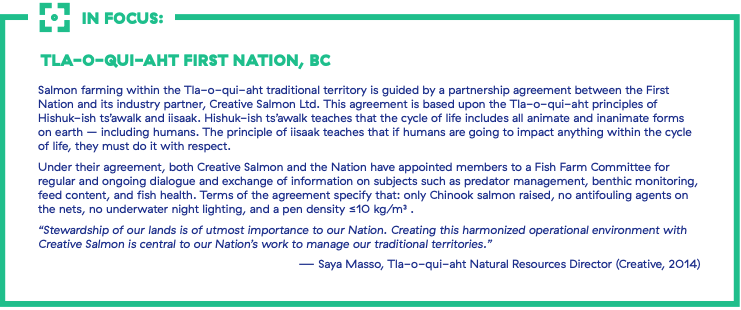
From Raising Opportunity: How BC Salmon could lead BC’s Post COVID Recovery
What Does the Government Decision Mean?
“Ultimately companies are going to have to make a decision as to whether they can really stay in business,” explained Fraser.
That, in turn, means less business for the companies that supplied them with goods and service.
“And it just keeps going down and down and down. I don’t think people, and certainly the federal government, doesn’t understand how fragile our economy is, particularly now.”
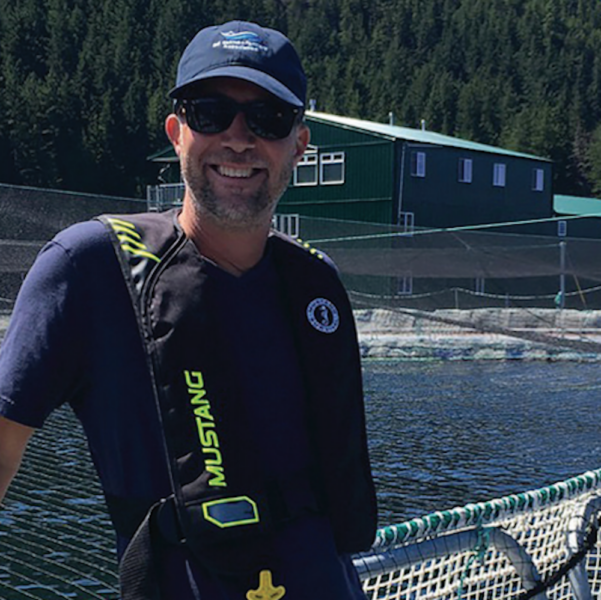
John Paul Fraser, President of the BC Salmon Farmers Association – courtesy BCSFA website
Need for a reset
“What I am trying to do is fully produce the information that we all need to have to understand the ramifications of the government decision and reset our thinking based on that,” said Fraser.
“When it becomes clear who and how many people are going to be swept up in this – our neighbours, friends … businesses apparently not aligned with aquaculture, but actually aligned if you look at the numbers carefully – I hope it causes people to wonder ‘could this have been done better.’ If we can do that, then there may be a way to find solutions for the problems this decision is going to create.”
“Government did not do its due diligence. If the Minister was making this decision in her backyard, I guarantee she would have. If the federal government had seats they thought they could win, they would have. This is a government … that is motivated by voices and interests [in Vancouver], as opposed to voices and interests in Campbell River, Gold River, Port McNeill, Sayward, Port Hardy, Clayoquot, Tofino, Sechelt, Comox. This government has no prospects in any of those places. So I think it acted accordingly, which is without care.”


